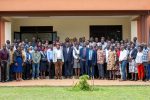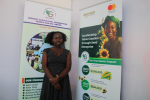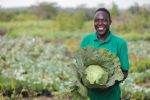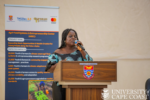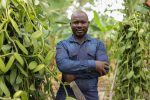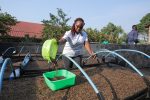The University of Bamenda in Cameroon Announces First Cohort of TAGDev 2.0 Program Scholars for the 2025/2026 Academic Year
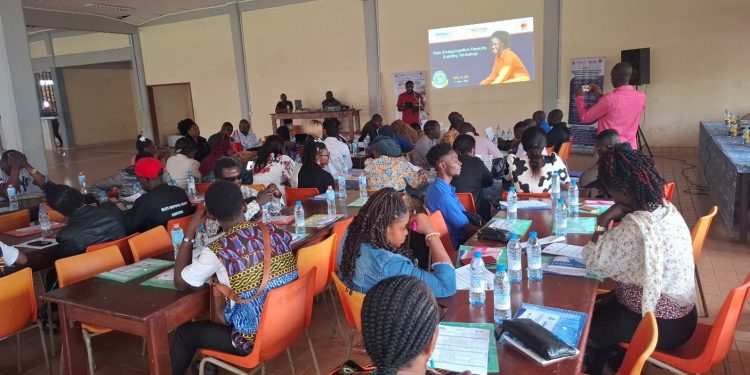
The University of Bamenda (UBa) is proud to announce the selection of its first cohort of scholars under the TAGDev 2.0 program – a transformative initiative in partnership with the Regional Universities Forum for Capacity Building in Agriculture (RUFORUM) and Mastercard Foundation.
The University of Bamenda as a public university is a leading national institution of higher learning geared towards meeting present and future development challenges through efficient teaching, research and sterling innovation. This is captured in its motto: Knowledge-Probity-Entrepreneurship. To this end, the University seeks:
- To provide quality and need-based teaching and research in various fields of learning and human endeavour.
- To instill in our student’s lifelong probity and hands-on intellectual insurance.
- To address dynamic development needs in the backdrop of national, international, socio-economic and environmental challenges.
In these strategies the university remains apolitical, inclusive in every sense, (disability, gender, race, religion, age, nationality, marginalized) transparent and accountable in its training, management and financial processes. While providing training in the liberal arts and sciences, priority areas for development comprise agriculture in the grassland savanna setting, agribusiness and e-commerce/digital innovation, health, environmental studies, engineering and technology. Community engagement through outreach programs and cooperation with other HEIs worldwide and the private sector are rigorously pursued.
Selection process
The call for application for the TAGDev 2.0 scholarship was launched on 4th of March and ran till 1st of April 2025. The TAGDev 2.0 attracted a total of 695 applications, of which 308 were male and 387 females. Of these 56 are refugees/internally displaced persons and 26 differently abled youth. After an extensive selection process coordinated by RUFORUM, 51 outstanding candidates were awarded scholarships. Interested candidates applied directly to The University of Bamenda for admission into the various degree programs advertised and at the same time applied for the scholarship through the RUFORUM online platform. Candidates deemed qualified for admission by the university were then further scrutinized by an independent consultant using the socio-economic analysis tools based on the declarations of the applicants. Shortlisted candidates were then informed and home validation exercise carried out during which an applicant completed the psychometric test online and responded to the set of questions aimed at evaluating the leadership skills of each individual. The ranking through a well-developed methodology was then presented to various teams including the Technical Committee of the TAGDev 2.0 program for final validation of selected candidates.
Below is a table listing the selected scholars for the Bachelor’s program
| Nr | Awarded Scholar | Gender | Course |
| 1. | Felix Mudra Mbisah | Male | BSc. Agri-business Technology |
| 2. | Njie Grace Egbe Nzouabet | Female | BSc. Agri-business Technology |
| 3. | Tung Ghang Clarise | Female | BSc. Agri-business Technology |
| 4. | Anwi Njinwe Philomena | Female | BSc. Agri-business Technology |
| 5. | Valeri Tanguong Mbah | Male | BSc. Agri-business Technology |
| 6. | Melvise Wulnikong Ayeah | Female | BSc. Agriculture and Environmental Engineering |
| 7. | Quintus Nyuysenimo Rannyuy | Female | BSc. Agriculture and Environmental Engineering |
| 8. | Biloh Tubuoh Lovette | Female | BSc. Agriculture and Environmental Engineering |
| 9. | Kaine Mbarou Ba | Female | BSc. Agriculture and Environmental Engineering |
| 10. | Kelly_Diean Kigha_Adzemo | Female | BSc. Agriculture and Environmental Engineering |
| 11. | Elvira Mafor Lekunze | Female | BSc. Animal Production Technology |
| 12. | Precious Mallah Nfoh | Female | BSc. Animal Production Technology |
| 13. | Frankline Techwi Manjoh | Male | BSc. Animal Production Technology |
| 14. | Blessing Fonneba Dorine | Female | BSc. Animal Production Technology |
| 15. | Precious Djou Amah | Female | BSc. Computer networks and systems maintenance |
| 16. | Faith Fru Chefor | Female | BSc. Computer networks and systems maintenance |
| 17. | Victory Tita | Female | BSc. Computer networks and systems maintenance |
| 18. | Nuella Cheah Wam | Female | BSc. Computer networks and systems maintenance |
| 19. | Bonzum Rinwi | Male | BSc. Computer networks and systems maintenance |
| 20. | Louis Akeh Junior Egebe | Male | BSc. Computer networks and systems maintenance |
| 21. | Ndimanjeh Pekiantung Erastus | Male | BSc. Computer networks and systems maintenance |
| 22. | Nerville Nwati | Male | BSc. Computer networks and systems maintenance |
| 23. | Amandine Ngoinsam Chia | Female | BSc. Crop Production Technology |
| 24. | Nkengfack Nisa Momo | Female | BSc. Crop Production Technology |
| 25. | Derick Mingo Tandietii | Male | BSc. Crop Production Technology |
| 26. | Akinimbom Joy Chah | Female | BSc. Food Science and Technology |
| 27. | Cheahlo Diom Hycentha | Female | BSc. Food Science and Technology |
| 28. | Larissa Mbenoweh | Female | BSc. Food Science and Technology |
| 29. | Shansline Jie Duh | Female | BSc. Food Science and Technology |
| 30. | Blessing Ndong | Female | BSc. Food Science and Technology |
| 31. | Jeccentha Ndi Itangi | Female | BSc. Food Science and Technology |
| 32. | Queentesia Tangwe | Female | BSc. Food Science and Technology |
| 33. | Joshua Unji Wajuku | Male | BSc. Forestry and Wild Life Technology |
| 34. | Ezikiel Asana Chimayin | Male | BSc. Forestry and Wild Life Technology |
| 35. | Brandon Njeba Bawe | Male | BSc. Forestry and Wild Life Technology |
| 36. | Nubitgha Nyonglema Beccine Edith | Female | BSc. Forestry and Wild Life Technology |
| 37. | Treasure Wara Ndingsa | Male | BSc. Renewable Energy Technology |
| 38. | Elvis Tamighang | Male | BSc. Renewable Energy Technology |
| 39 | Larisa Shalanyuy Njodzenso | Female | BSc. Renewable Energy Technology |
| 40 | Lody Samsimbom Ngong | Female | BSc. Renewable Energy Technology |
| 41 | Meringi Ako Hilda | Female | BSc. Renewable Energy Technology |
Below is a table listing the selected scholars for the Master’s program
| Nr | Awarded Scholar | Gender | Course |
| 1. | Lycongah Bobga Blessing | Female | MSc. Nutrition, Food and Bioresource Technology |
| 2. | Cathleen Nyongvella | Female | MSc. Crop Production Technology |
| 3. | Nadesh Ginyui Nsobo | Female | MSc. Crop Production Technology |
| 4. | Sidoine Ngwa Soh | Female | Msc. In Food and Bioresource Technology (FBT) |
| 5. | Awah-Mengwi Solange | Female | Msc. In Food and Bioresource Technology (FBT) |
| 6. | Sirri Cindy Akumengwa | Female | Msc. In Food and Bioresource Technology (FBT) |
| 7. | Tata Marinette Ning Tata | Female | Msc. In Food and Bioresource Technology (FBT) |
| 8. | Ransome Chianaih Chia | Male | Msc. In Food and Bioresource Technology (FBT) |
| 9. | Anita Ringnyu Jamba | Female | Msc. In Nutritional Sciences (NS) |
| 10. | Adeline Tangoh Frinde | Female | Msc. In Nutritional Sciences (NS) |
About RUFORUM and TAGDev
RUFORUM, established in 2004, is a network of 175 universities across 40 African countries which collaborates globally with other university networks, development partners, policymakers, and leaders to leverage synergies and work towards shared objectives in delivering science solutions for development, human capital development, and institutional reform in the African Higher Agricultural Education (HAE) system. RUFORUM recognises youths as the driving force behind change and are leading the change for a better Africa. Launched in partnership with the Mastercard Foundation, the TAGDev 2.0 (Transforming African Agricultural Universities to meaningfully contribute to Africa’s Growth and Development), a scale-up to TAGDev 1.0 is a 10 year (2023–2033) program being implemented in twelve (12) African universities, namely;
- African University (Zimbabwe
- Egerton University (Kenya)
- Gulu University (Uganda)
- Malawi University of Science and Technology (Malawi)
- Mohammed VI Polytechnic University (Morocco)
- National University of Agriculture Benin
- Uganda Martyrs University (Uganda)
- The University of Bamenda (Cameroon)
- University of Eldoret (Kenya)
- University of Cape Coast (Ghana)
- University of Port Harcourt (Nigeria)
- University of Free State (South Africa)
TAGDev 2.0 is designed to;
- Expand equal work opportunities for young women and men in the agricultural sector
- Improve climate adaptive agricultural production and productivity with a focus on value chains
- Strengthening the quality of higher agricultural education outcomes in training, research and innovation.
Why it matters
The University of Bamenda as an implementing partner in the TAGDev 2.0 program is drawing several benefits from collaborations that are enabling it to continue to progress on its transformative education trajectory. The TAGDev 2.0 program is enabling the university to develop innovative and adaptive pedagogies with emphasis on student workplace immersion programs and intensely monitored internship programs for which students earn credits and work experience. Also, the problem-based learning (PBL) approach has been adopted and its scope constantly expanding under the TAGDev 2.0 program allowing students working in teams on the PBL to solve specific community problems and create social enterprises notably allied to agribusiness. Hybrid (e-learning and in-person) has also been adopted as a policy and other policies in the domains of research and innovation including intellectual property are being revamped. Through the TAGDev 2.0 program the community development/engagement strategies of the university are being fine-tuned especially in the agriculture and horticulture value chain. This aligns with the mission statement of the University that institutionalizes outreach and community engagement. Within the context of the TAGDev 2.0 program, The University of Bamenda instills in its students 21st century skills including leadership and civic responsibility for sustainable development. These skills combined with entrepreneurship training enable our students to transition into work upon graduation and create employment for themselves. The University of Bamenda is cultivating a culture of inclusion allowing students with various challenges to study at UBa. Through TAGDev 2.0, UBa is sharing these inclusion, gender and safeguarding practices with various universities and other stakeholders across the continent creating impact in the lives of young people and empowering them to create jobs. This first cohort of scholarship students are coming into this milieu and shall be accompanied by the institution to become the change makers they strive to be. The TAGDev 2.0 program will support young students: females, males, refugees, internally displaced persons, and differently abled persons from economically disadvantaged background but academically competent to access university education. This will contribute towards ensuring equitable and inclusive access to quality education for wealth and job creation among Cameroonian youths.
To learn more about the TAGDev program at UBa, follow the social media handles below;
